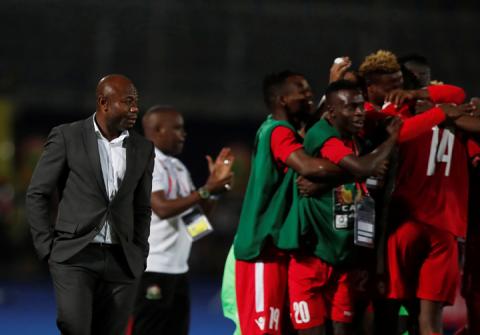Advertisement
No character, no experience, says Tanzania coach in brutal assessment
CAIRO (Reuters) - Tanzania's first Africa Cup of Nations participation for 39 years came to a premature end because the team lacked character and experience, coach Emmanuel Amunike said in a brutally honest analysis.
Coaches nowadays generally steer clear of criticising their own team for fear of 'losing the dressing room' but the former Sporting, Barcelona and Nigeria player had no such concerns as he offered a withering assessment of his players' efforts.
Tanzania's 3-2 defeat to Kenya on Thursday, after twice going in front, meant they became the first team to be eliminated from the 24-team tournament where only eight teams exit at the group stage.
The use of the head-to-head rule means they are guaranteed to finish bottom of Group C after losing their first two games.
"If you do not know how to manage your game, you pay the price," Amunike said. "There were a lot of crazy things going on and we committed a lot of mistakes. Our positioning was wrong, our marking was wrong."
Amunike was miffed that Kenya scored their second equalising goal with a near post header from a set piece.
"That is something we have practised over and over again... but players are players," he said. "As a coach you stand on the sidelines and you are helpless... there is no character in the team. We lack the experience.
"It's an eye opener for Tanzanian football -- the truth is we are not in a position to compete."
Amunike, who has had a low-key managerial career, took over as Tanzania coach last August and became a national hero after guiding them to the finals, albeit from a weak qualifying group where their rivals were Uganda, Lesotho and Cape Verde.
Only three members of the squad are based in Europe -- Blackpool's Adi Yussuf, who has spent his career roaming the lower divisions of the English league, Racing Genk's Mbwana Samatta and Faridi Mussa, who plays in the lower tier of the Spanish league.
Fourteen members of the squad are based in the Tanzanian league, something Amunike said was holding them back.
"It's important that the players must be able to interpret the game, know what to do when they have the ball and don't have the ball," he said.
"The players need exposure to stronger competition, in a place where they can grow and compete with other players in Africa.
"I'm not being harsh, just realistic."
(Writing by Brian Homewood; editing by Sudipto Ganguly)



















Add new comment